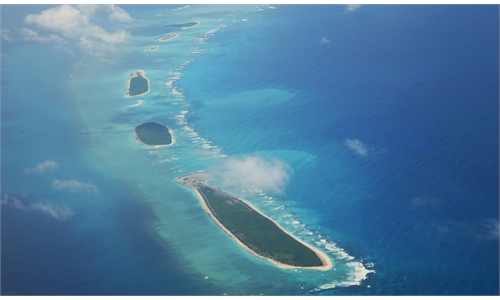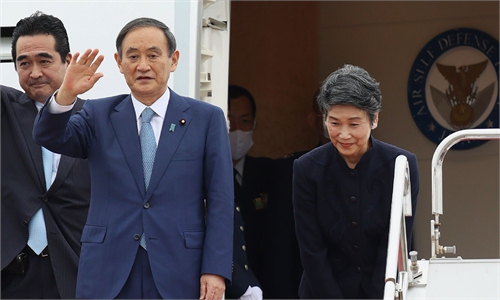
People stand at a corner in Tokyo's Shibuya district, Japan on Sunday. Shibuya district, which usually draws swarms of costumed partygoers at night, has asked people not to come out in 2020 due to concerns about COVID-19. Photo: AFP
Japan will take a more offensive stance against China over maritime boundary disputes under the incitement of the US, and put China under siege, and it will also incite surrounding countries to do the same, Chinese experts warned, as the US and Japan announced plans to launch a drill on Monday that includes 46,000 personnel against the background of "wariness over China's maritime activity."
The drill will be conducted on islands 200 kilometers from Kagoshima city in Japan until November 5. The geography in the area is similar to that on the Diaoyu Islands and the training is being conducted under the strong hypothesis of "unexpected events on the islands," Japan's Kyodo News Agency reported Saturday, citing the Japanese defense authority.
The move indicates that the US and Japan are exploring new cooperation under their wariness against China, the report said.
The two sides are showing their targeting of China more clearly and openly, and making actual military preparations for conflicts with China over the Diaoyu Islands issue, rather than reaching agreements at the governmental level, Li Haidong a professor at the Institute of International Relations of the China Foreign Affairs University, told the Global Times on Sunday.
The US wants to use Japan as a chess piece to contain China in the Asia-Pacific region, while the latter wants to borrow the former's power to bargain with China over the Diaoyu Islands issue, Li explained, noting that the drill kicking off on Monday indicates that the two sides' cooperation in security is deepening.
The drill will send a strong signal to surrounding countries, the Kyodo report said, citing an unnamed Japanese defense official.
The remarks sound very dangerous, as Japan intends to incite surrounding countries that have territorial disputes to conduct similar drills and put China into a state of "fighting a group," Li warned.
Egged on by the US, Japan might become more and more offensive in its maritime boundary disputes with China, he noted.
India on October 19 said that Australia will participate in its annual naval exercise with the US and Japan in the next month, a move expected to give a boost to defense cooperation among the four members of the Quadrilateral Security Dialogue, media reported.
By participating in the joint drill, the four countries are clearly demonstrating their intention to compete with China and Russia on the seas, according to Li.
But the joint drill may be more of a gesture rather than actually enhance the four sides' capacity to respond to emergencies, Li noted, stressing that China, in response, should continue to enhance its own military capacity.



